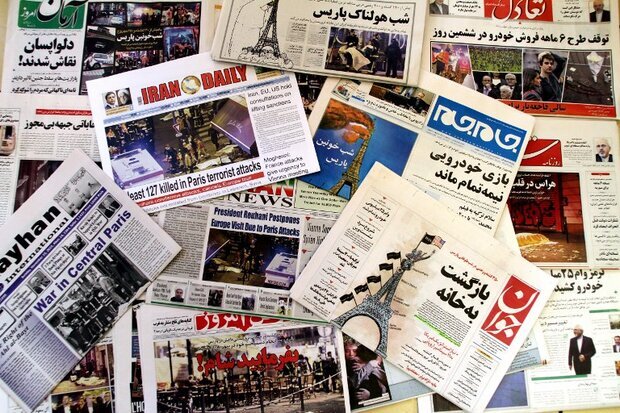Warm greetings from Riyadh to Tehran

In a note, Hamshahri wrote about the visit of the Saudi foreign minister to Tehran.
It wrote: About 12 years after the last visit of a high-ranking Saudi official to Tehran, the Saudi foreign minister arrived in Tehran yesterday (Saturday) to turn a new page in relations between Iran and Saudi Arabia. Considering the recent agreements between the two countries, the trip is important to develop bilateral relations. It was in the late August of 2012 that Abdul Aziz bin Abdullah, the son of the king of Saudi Arabia and his special representative, traveled to Tehran to attend the 16th Non-Aligned Movement meeting. At that time, Abdul Aziz bin Abdullah was carrying a special written message from King Abdullah to the Iranian authorities, and now Faisal bin Farhan is also the bearer of a message from King Salman bin Abdul Aziz to the Iranian president, a message that is said to be about the future development of Tehran-Riyadh relations. The meeting of the Saudi Foreign Minister with high-ranking officials of Iran, including the minister of Foreign Affairs and the president, took place in a situation where the resumption of diplomatic relations between Tehran and Riyadh have seen significant changes in the past months and both sides have taken important steps towards the implementation of the Beijing agreement.
Siasat-e-Rooz: A journey for wider relations
In its editorial, Siasat-e-Rooz addressed the trip and the relations between Iran and Saudi Arabia. It wrote: The actions of countries like Saudi Arabia to develop relations with Iran does not originate from Iran's weakness, but it comes from the power that it has been able to create in domestic, regional, and global arenas, especially as the crisis in Ukraine and escape from Afghanistan proved to American allies that the U.S. is not a reliable ally. Second, Faisal bin Farhan's trip to Iran was the result of the mediation of regional countries such as Iraq and Oman as well as China, and this shows the ability of the regional countries to talk and interact without any need to outsiders. This can be used for other regional issues, including countering the terrorism crisis, resolving the Palestinian issue, etc...
The final point is that the relations between Iran and Saudi Arabia, as the two top powers of the region and the Islamic world, can provide the basis for greater convergence between regional countries and the larger Islamic world. This is because the two countries have the ability to bring countries together, and can help establish more interactions among Islamic countries and ultimately accelerate the process of multilateralism instead of Western unilateralism.
Shargh: Tel Aviv is in limbo
In a commentary, Shargh addressed the positions of the Israeli regime regarding the nuclear negotiations and said: The strategy of Israeli authorities and some reports show that Tel Aviv and the Netanyahu government are now stuck in a diplomatic and political limbo to accept or not to accept a possible agreement between Iran and the United States.
In this regard, the Haaretz newspaper quotes an unnamed senior Israeli official who admits that the Biden government has regularly been informing Israel about its indirect negotiations with Iran, including the negotiations that took place in Oman last month, and Israel is still reviewing the terms of the potential understanding between Iran and the United States and has not yet decided to respond to this issue. In addition, the senior official strongly rejected reports that Israel is somehow working against the talks or trying to destroy any possible understanding.
Farhikhtegan: The need for a Russian cultural center in Iran
In an analysis, Farhikhtegan discussed the issue of establishing a Russian cultural center in Iran. It wrote: In the new world order, Iran and Russia must move towards convergence. The activity of a Russian cultural center is an important step to carry out cultural interaction to introduce the diverse capacities of this tricontinental country. Unfortunately, some Western-oriented currents have always wanted to hurt the relations between Eastern powers by using various capacities, especially spreading rumors and false news. The need to establish a Russian cultural center in Iran comes from the need that by doing this, this country can introduce itself directly and without the intervention of intermediary Western sources that have biased views.
The background of the development of political and economic relations between the two countries is definitely the detailed knowledge of the two nations. Upon finalizing the agreement, just as Iran has active cultural centers in Russia, Russia will also set up its cultural center in Iran. This issue will help the mutual action of the two countries against American unilateralism and the fight against the cultural invasion of the West and the recognition of the nations in the new world order.
Leave a Comment